| Srl | Item |
| 1 |
ID:
053792
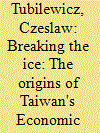

|
|
|
| 2 |
ID:
133666
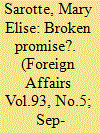

|
|
|
|
|
| Publication |
2014.
|
| Summary/Abstract |
Moscow has long argued that in expanding NATO eastward, Washington broke the promise it made to Soviet leaders shortly after the Berlin wall fell. But new evidence shows that the United States never actually made such a pledge.
|
|
|
|
|
|
|
|
|
|
|
|
|
|
|
|
| 3 |
ID:
130861
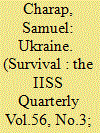

|
|
|
|
|
| Publication |
2014.
|
| Summary/Abstract |
The ugly truth is that Moscow can still undermine any Western plan for Ukraine's future. The crisis is likely to lead to a period of sustained disequilibrium and instability. As Ukraine's winter of domestic discord transformed into a spring of territorial partition and instability, European and American officials seemed to be speaking from an agreed set of talking points in their public remarks on the crisis. While hopeful transatlanticists sought to construe this remarkable consistency as a demonstration of a new seriousness of purpose in the West, the litany of warnings, threats and prescriptions for resolution (inevitably characterised as either an 'off-ramp' or 'de-escalation') spoke more to the desperation of those uttering them to quickly find a new, stable equilibrium for Ukraine, Russia and the international system. Yet the talking points and buzzwords, no matter how many times they are repeated, do not in fact describe either a sustainable equilibrium or an end point to the crisis. Instead, the disequilibrium and instability of the Ukrainian crisis seem likely to endure for some time: the search for a 'new normal' promises to be long, costly and highly disruptive of both individuals' lives and the international order.
|
|
|
|
|
|
|
|
|
|
|
|
|
|
|
|
| 4 |
ID:
130858
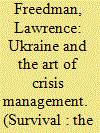

|
|
|
|
|
| Publication |
2014.
|
| Summary/Abstract |
Crisis management is the most demanding form of diplomacy. So far neither Russia nor the US and its European allies have handled it particularly well. Half a century ago, after the conflicts over Berlin and Cuba, a new term of art came into vogue: 'crisis management'. American Secretary of Defense Robert McNamara was even quoted as saying that crisis management had taken over from strategy.1 A small literature came to be devoted to the subject. In a number of respects, the term and the key themes it invoked were behind much of the debate on security policy for the remainder of the Cold War.2
The term 'crisis' comes from a Greek word indicating choice or decision, and came to refer to the turning point in a disease. The crisis was the moment when the fever reached a peak and the patient was either going to get a lot worse or a lot better. It is the moment usually marked in TV dramas by delirious patients, caring nurses, anxious relatives and lots of patting down of sweating foreheads with cold sponges. The idea of an international crisis has the same sense of stress and urgency. It means a conflict has come to a head, normally because one side has taken a bold but provocative initiative. At the moment of crisis, some big, long-standing conflict is about to be resolved, either through last-minute diplomacy or by force. The drama comes from a deadline, perhaps reinforced by an ultimatum, and intense media attention. On the news channels, the moment is usually marked by late nights in the corridors of power, emergency summits and tense United Nations Security Council meetings, while staying on the alert for military mobilisations and movements. Leaders of major powers would be expected to show that they had the temperament and character for a crisis. A steely resolve and calm judgement would be at a premium. This was the point of Hillary Clinton's famous challenge to candidate Barack Obama in 2008 as to how he would cope when 'it's 3 a.m. and your children are safe and asleep. But there's a phone in the White House and its ringing. Something's happening in the world.
|
|
|
|
|
|
|
|
|
|
|
|
|
|
|
|
| 5 |
ID:
133665
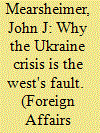

|
|
|
|
|
| Publication |
2014.
|
| Summary/Abstract |
Conventional wisdom in the West blames the Ukraine crisis on Russian aggression. But this account is wrong: Washington and its European allies actually share most of the responsibility, having spent decades pushing east into Russia's natural sphere of interest.
|
|
|
|
|
|
|
|
|
|
|
|
|
|
|
|